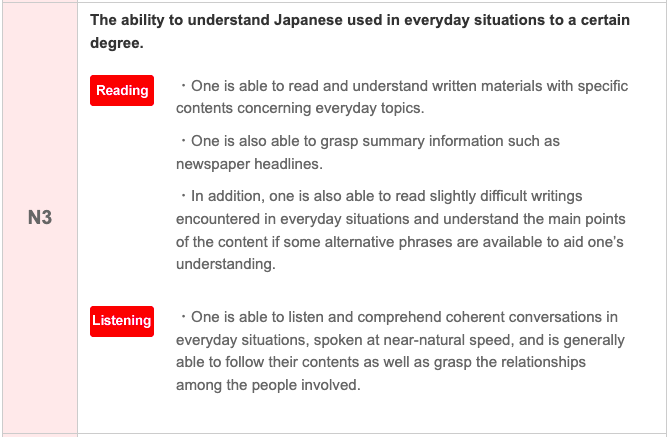Introduction
The Japanese Language Proficiency Test (JLPT) N3 marks the transition from beginner to intermediate Japanese language skills. As you prepare for the N3 exam, you’ll need to build on the foundations established at the N4 level while further developing your grammar, vocabulary, kanji, listening, and reading comprehension skills. This blog post will provide essential tips and resources to help you succeed on the JLPT N3 exam.
Understand the Test Format
Begin by familiarizing yourself with the JLPT N3 test format, which consists of three sections: Language Knowledge (vocabulary and grammar), Reading, and Listening. Each section is timed, so efficient time management is crucial during the test.
Deepen Your Knowledge of N3 Grammar
The JLPT N3 tests your understanding of intermediate Japanese grammar. Continue using intermediate textbooks such as “An Integrated Approach to Intermediate Japanese” and “Tobira.”
Grow Your Vocabulary
For the JLPT N3, you’ll need to learn approximately 3,000 vocabulary words. Utilize flashcards and language apps like “IPPO” and “Anki” to study new words. Reinforce your learning by consuming Japanese media, such as novels, movies, and TV shows, that are suitable for your language level.
Learn More Kanji
At the N3 level, you should aim to learn around 650 kanji.
Hone Listening Skills
Improving your listening skills is essential for the JLPT N3. Expose yourself to a variety of Japanese audio materials, such as podcasts, TV shows, and movies, tailored to your language level. Websites like “IPPO” offer N3-specific listening practice. Take notes and summarize what you hear to actively engage with the content.
Enhance Reading Comprehension
For the N3 exam, focus on further developing your reading comprehension skills. Engage with level-appropriate texts, such as novels, essays, and news articles. Practice reading out loud to improve your pronunciation and fluency, and use online resources like “NHK News Web Easy” and “IPPO” for additional content.
Take Practice Tests
Regularly take practice tests to familiarize yourself with the test format and question types. This will help you gauge your progress and identify areas where you need to focus your studies. Use resources like the official JLPT website or “IPPO” for practice tests and answer explanations.
Create a Study Schedule
Develop a consistent study schedule, allocating daily practice time for grammar, vocabulary, kanji, listening, and reading comprehension. Set realistic goals based on your desired exam date and adjust your schedule as needed.
Stay Motivated
Maintaining motivation is essential for achieving success on the JLPT N3. Set clear objectives, track your progress, and celebrate your accomplishments. Connect with other Japanese learners, join study groups, or participate in language exchange programs to keep yourself engaged and motivated. You can use “Hello Talk” to motivate yourself.
Conclusion
Passing the JLPT N3 is a significant milestone in your Japanese language learning journey. By understanding the test format, deepening your knowledge of grammar, growing your vocabulary, learning more kanji, and honing your listening and reading skills, you can achieve success on the N3 exam. As you progress through the JLPT levels, the skills and confidence you gain from passing the N3 exam will serve as a robust foundation for tackling more advanced Japanese language studies. Stay committed, enjoy the learning process, and embrace the challenges that come with mastering a new language. With perseverance, dedication, and a positive attitude, you’ll be well-equipped to conquer the JLPT N3 and continue your journey toward Japanese language proficiency. Good luck, and happy studying!

We offer the Best Online Japanese Learning (All Free), and our goal is to facilitate the adoption into life in Japan. Our service “IPPO” is made by native Japanese teachers and professionals. The tips we share with you can help you to learn Japanese efficiently and pass JLPT (Japanese Language Proficiency Test).




